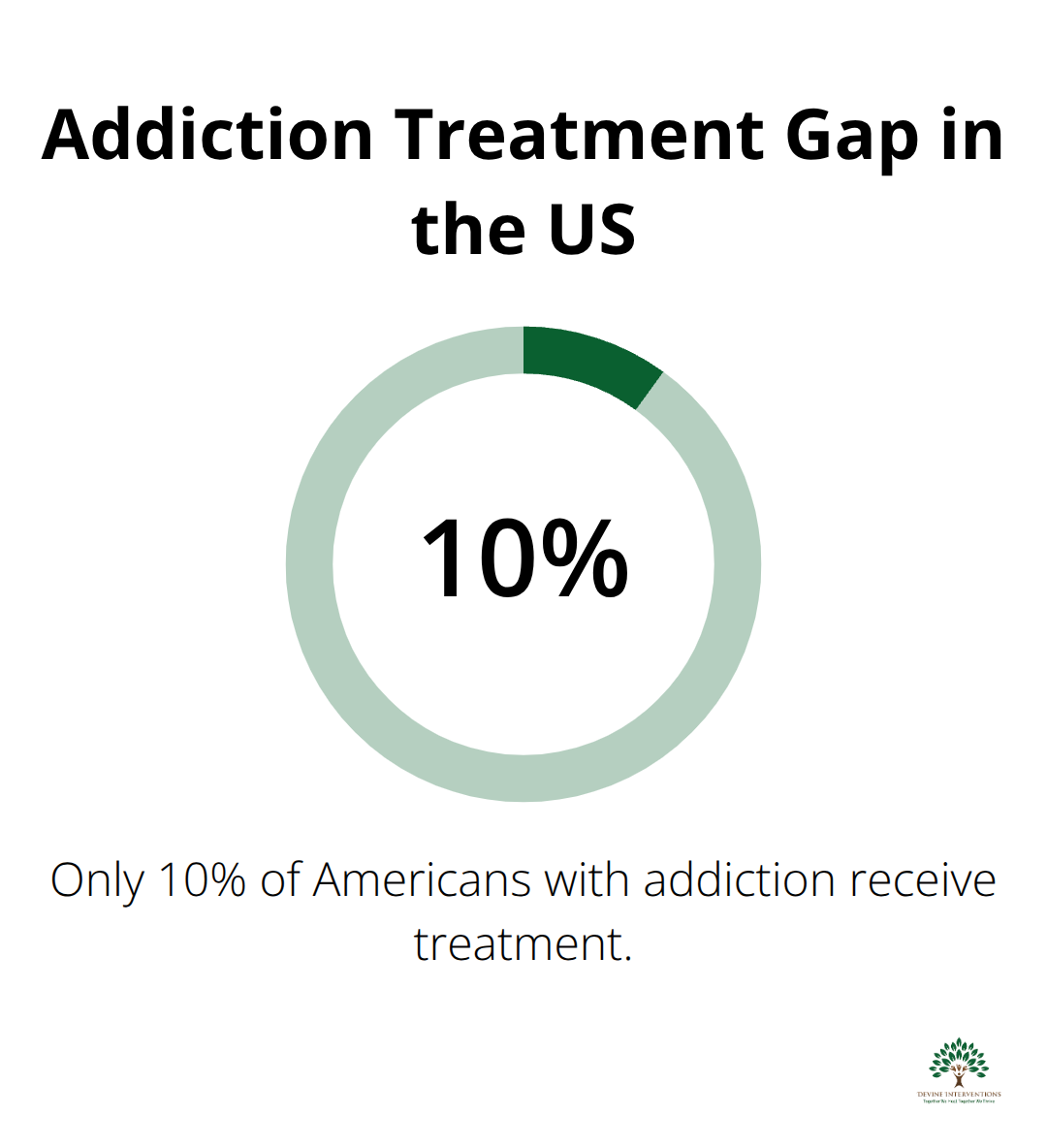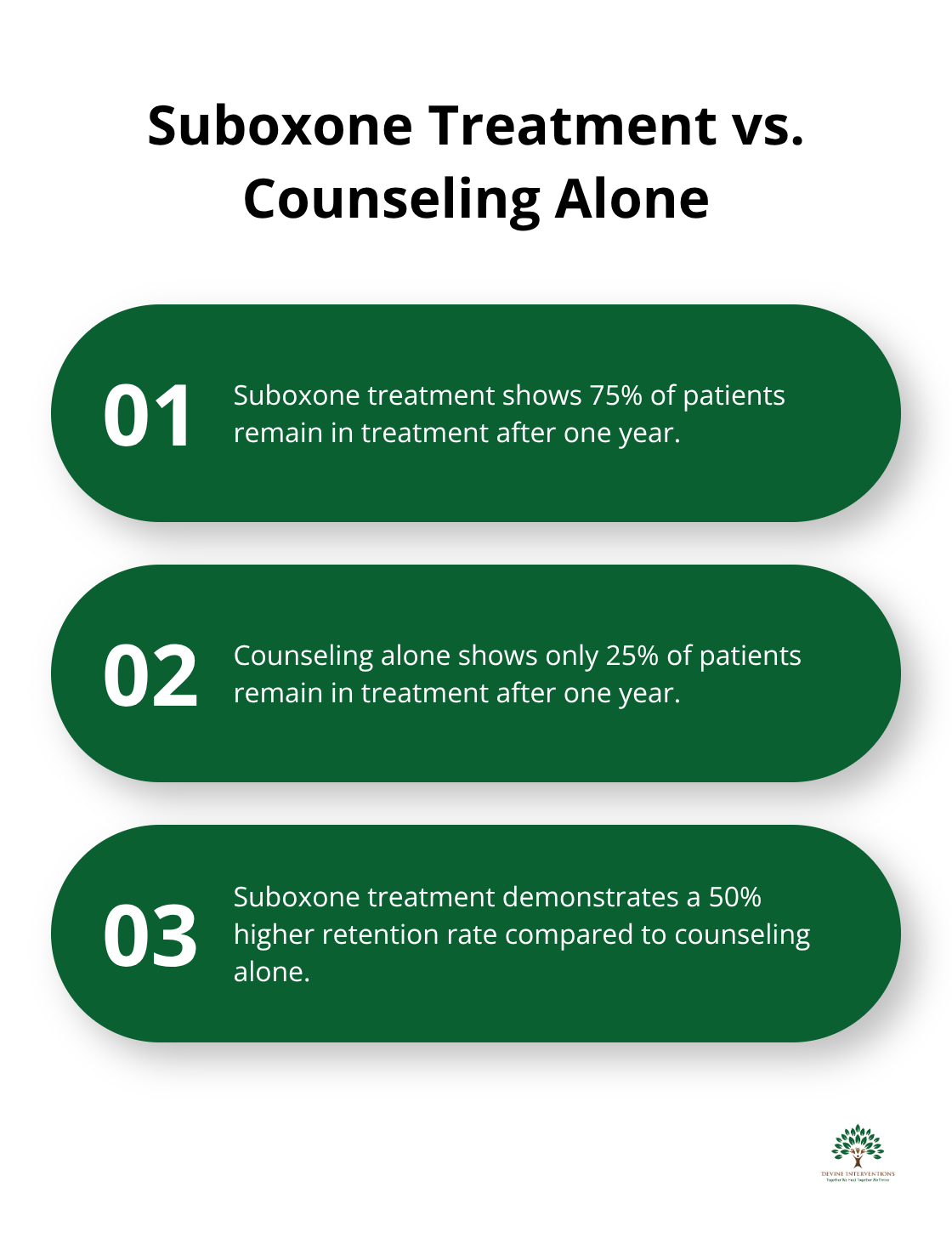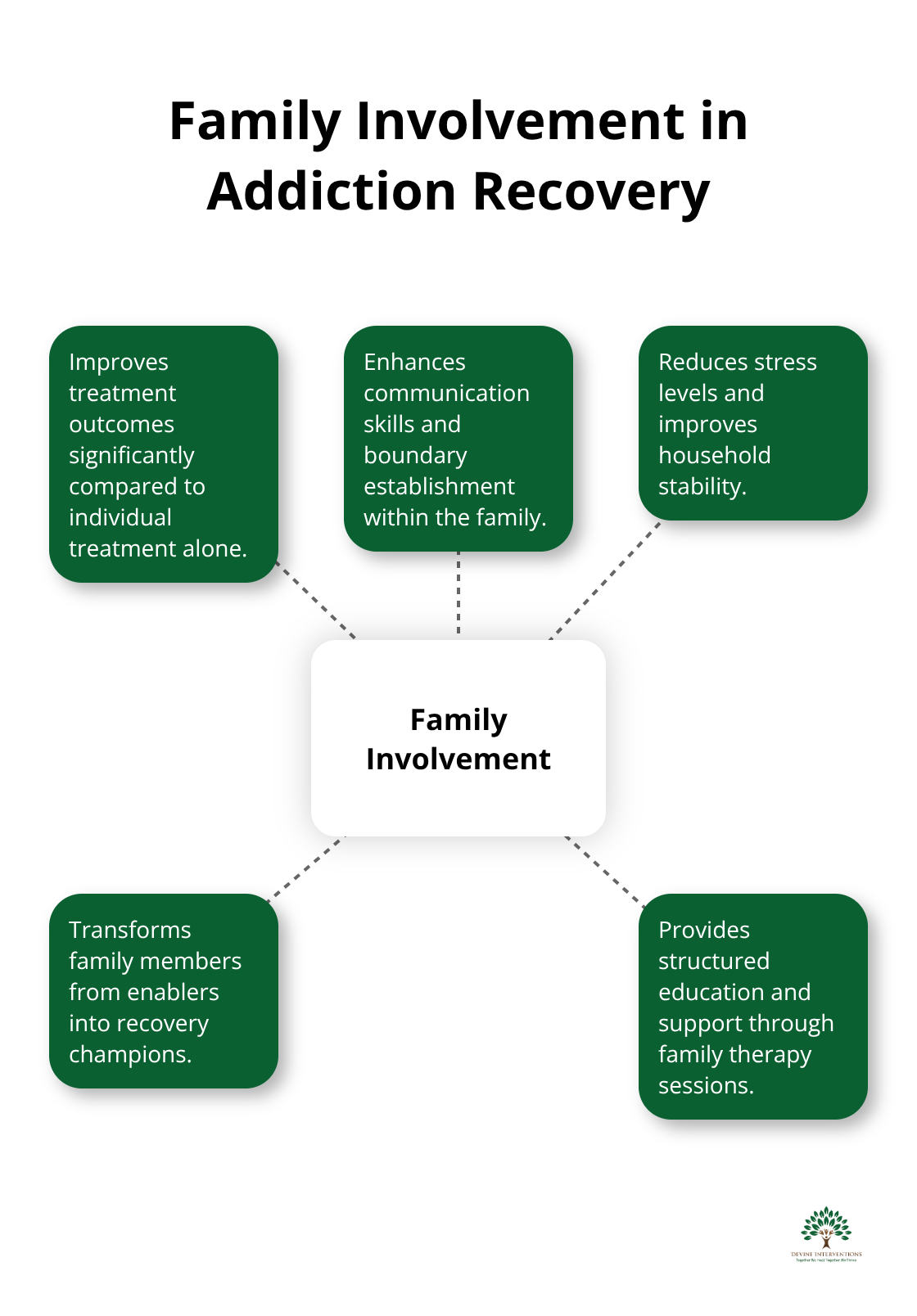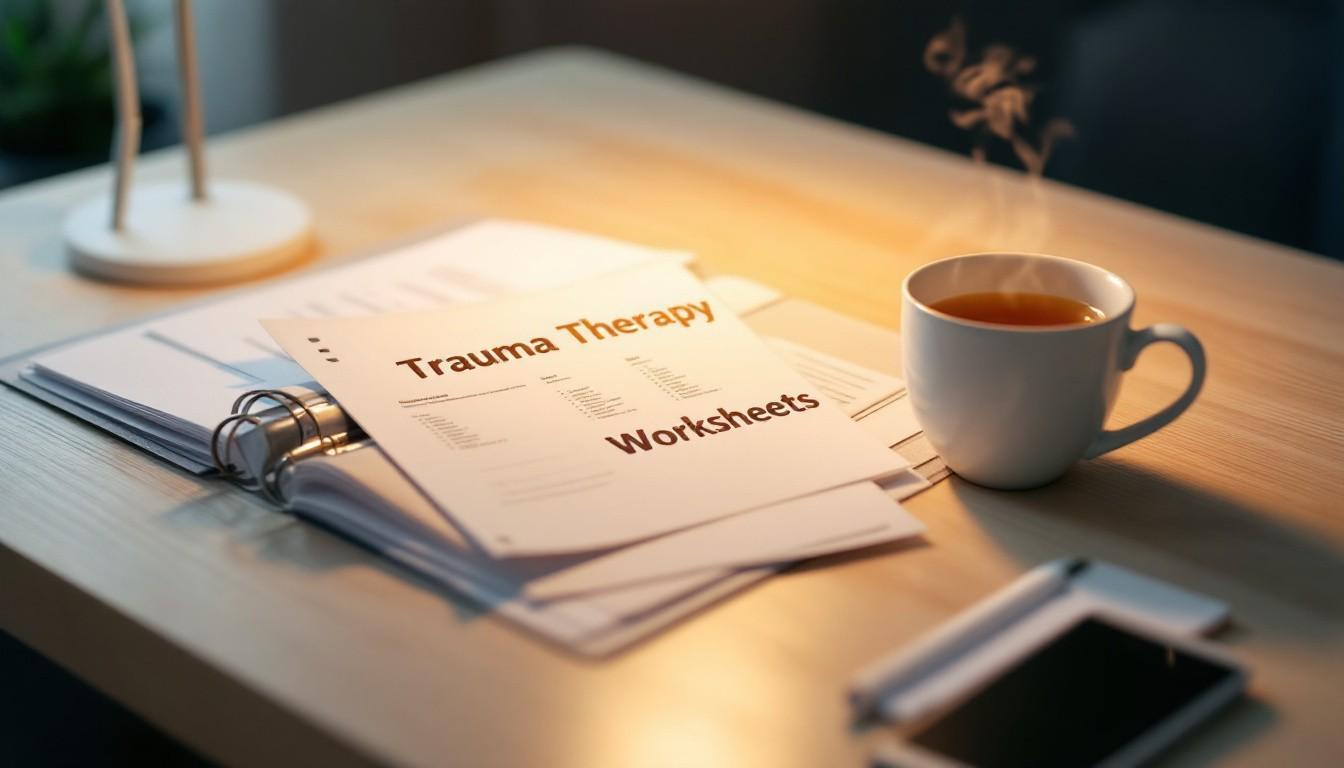Substance abuse affects millions of people and their families, creating challenges that can feel overwhelming. The path to recovery requires effective coping strategies for substance abuse that address both the addiction and its underlying causes.
We at Devine Interventions understand that recovery is possible with the right support and evidence-based approaches. This guide explores proven strategies that can help you or your loved one build a healthier, substance-free life.
Understanding Substance Abuse and Its Impact
Recognizing the Warning Signs of Substance Abuse
Substance abuse creates specific behavioral, physical, and social changes that become increasingly difficult to hide. Physical warning signs include bloodshot eyes, sudden weight loss or gain, tremors, slurred speech, and poor personal hygiene. Behavioral indicators include frequent absences from work or school, abandonment of hobbies and activities, secretive behavior, mood swings, and lies about whereabouts. The National Institute on Drug Abuse reports that approximately 21 million Americans have at least one addiction, yet only 10% receive treatment. Early recognition saves lives and prevents devastating long-term consequences.

Physical and Mental Health Consequences
Substance abuse damages both body and mind in measurable ways. Alcohol abuse harms the liver, heart, and brain, with chronic users facing a 50% higher risk of stroke (according to the American Heart Association). Drug abuse causes cardiovascular problems, respiratory issues, and cognitive impairment. Mental health suffers equally, with substance users experiencing depression rates significantly higher than the general population. Sleep patterns become erratic, appetite changes dramatically, and concentration plummets. The brain’s reward system becomes hijacked, which makes normal activities feel meaningless while cravings intensify.
Impact on Relationships and Daily Life
Addiction destroys relationships systematically, starting with those closest to the individual. Family members report feelings of helplessness, anger, and emotional exhaustion when they deal with a loved one’s substance abuse. Work performance declines sharply, with drug abuse leading to an estimated $25.5 billion loss each year due to absenteeism and decreased productivity. Social isolation accelerates as healthy friendships dissolve and are replaced by relationships centered around substance use. Financial problems emerge rapidly, with the average family affected by addiction spending $1,200 monthly on substances and related consequences. These social costs compound and create a cycle where isolation fuels more substance use, making professional intervention essential for breaking these destructive patterns.
Evidence-Based Treatment Approaches
Medication-Assisted Treatment Delivers Measurable Results
Medication-assisted treatment represents the most effective approach for opioid and alcohol addiction, with FDA-approved medications like buprenorphine, methadone, and naltrexone that reduce relapse rates significantly. These medications work by blocking receptors or reducing cravings, which allows your brain chemistry to stabilize while you focus on recovery skills. Suboxone treatment has shown particularly strong results, with 75% of patients who remain in treatment after one year compared to just 25% with counseling alone.

Cognitive Behavioral Therapy Rewires Destructive Thought Patterns
Cognitive Behavioral Therapy stands as the gold standard for addiction treatment because it directly rewires thought patterns that trigger substance use. According to research, relapse rates for substance use disorders range from 40% to 60%, though this risk decreases sharply over time with proper treatment. The therapy teaches you to identify specific triggers, challenge distorted thinking, and develop concrete coping strategies. Sessions typically run 12-16 weeks, with homework assignments that reinforce new behaviors. CBT works particularly well when combined with medication (creating a comprehensive approach that addresses both physical and psychological aspects of addiction).
Group Therapy Creates Powerful Accountability Networks
Group therapy sessions create powerful accountability structures that individual therapy cannot match. Studies from the Journal of Substance Abuse Treatment show that people who participate in group therapy have 40% higher long-term sobriety rates compared to individual treatment alone. Groups like SMART Recovery use evidence-based techniques that include motivational enhancement and cognitive behavioral strategies, while traditional 12-step programs provide peer support and structured guidance. The most effective programs combine both approaches, with meetings 2-3 times weekly during early recovery when support needs peak.
Professional Treatment Teams Coordinate Comprehensive Care
Professional treatment teams coordinate multiple specialists to address every aspect of addiction recovery. These teams typically include psychiatrists, therapists, case managers, and medical doctors who work together to create individualized treatment plans. Case managers help navigate insurance requirements, connect clients to community resources, and coordinate between different treatment providers. This team approach reduces treatment gaps and prevents clients from falling through cracks in the healthcare system (which often happens when people try to manage multiple appointments and providers independently). The coordination becomes even more important when building your personal support network outside of professional treatment.
Building a Strong Support System
Family Members Transform From Enablers Into Recovery Champions
Family involvement determines recovery success more than any other single factor, but most families need specific training to avoid common mistakes. Research shows that family therapy significantly improves treatment outcomes compared to individual treatment alone. Parents and spouses must learn to distinguish between support and behavior that enables addiction, which requires structured education sessions with trained counselors.

Effective family programs teach communication skills, boundary establishment, and crisis intervention techniques through weekly 90-minute sessions over 12 weeks. Families who complete these programs report improved household stability and significantly reduced stress levels. The transformation happens when emotional reactions become strategic responses that reinforce recovery goals rather than undermine them.
Professional Treatment Teams Coordinate Comprehensive Care
Professional treatment teams coordinate multiple specialists to address every aspect of addiction recovery. These teams typically include psychiatrists, therapists, case managers, and medical doctors who work together to create individualized treatment plans. Case managers help navigate insurance requirements, connect clients to community resources, and coordinate between different treatment providers.
This team approach reduces treatment gaps and prevents clients from falling through cracks in the healthcare system (which often happens when people try to manage multiple appointments and providers independently). The coordination becomes even more important when you build your personal support network outside of professional treatment.
Community Resources and Support Groups Provide 24/7 Accountability
Community support groups create peer accountability networks that operate around the clock, which fills gaps between professional appointments. Research indicates that individuals who attend meetings regularly during their first year show improved recovery outcomes. SMART Recovery groups focus on practical skills like urge management and goal establishment, with participants who learn specific techniques they can implement immediately.
The most effective approach combines both meeting types, with newcomers who attend daily meetings for the first 90 days. Online support groups through platforms like In The Rooms provide access when transportation or schedule conflicts create barriers. Local community centers often host multiple group types, which allows individuals to find the specific format and philosophy that resonates with their recovery style.
Final Thoughts
Recovery from substance abuse demands commitment to proven coping strategies for substance abuse that address both immediate challenges and long-term wellness. The most successful individuals combine medication-assisted treatment, cognitive behavioral therapy, and strong support networks that include family members, professional treatment teams, and peer accountability groups. Statistics show clear differences between those who attempt recovery alone versus those who engage comprehensive treatment programs.
Professional help remains essential for sustainable recovery. We at Devine Interventions understand that each person’s path to recovery requires individualized care and evidence-based approaches. The combination of medical support, therapeutic intervention, and community resources creates the strongest foundation for lasting change.
Your first step toward recovery starts with acknowledgment that healing is possible and that you deserve support. Whether you need intensive outpatient programs, individual therapy, or medication management, professional treatment services provide the foundation for transformation. Your journey toward wellness begins with a single phone call to professionals who understand addiction and believe in your capacity for recovery.







